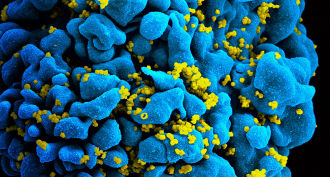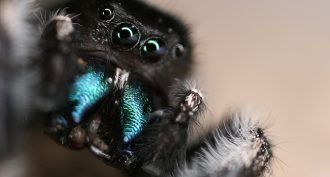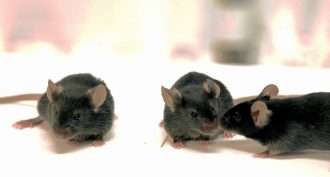Life
-
 Animals
AnimalsOur shocking eel story wins international prize
Roberta Kwok’s story on the shocking (and surprising) behaviors of electric eels was honored with a win for outstanding science writing.
By Janet Raloff -
 Microbes
MicrobesNew date for U.S. arrival of the AIDS virus
A new study shows that HIV started circulating at least a decade earlier than previously realized.
-
 Environment
EnvironmentVaping may put your smile at risk
As e-cigarette use among teens rises, scientists find that vaping may cause cellular damage to the mouth, gums and teeth. Even the cells’ DNA was affected.
-
 Genetics
GeneticsHuman DNA carries hints of unknown extinct ancestor
A new study suggests people today carry genetic traces of now-extinct species unknown to science.
-
 Animals
AnimalsSpidey sense: They can hear you!
Surprise! At least some spiders can hear us. Even without eardrums, jumping spiders can still detect airborne sounds from across the room.
By Susan Milius -
 Oceans
OceansBeaches can be a germy playground
Infectious microbes can flourish on sandy beaches. Scientists are now exploring how to find and monitor these hotspots for pollution that can make vacationers sick.
-
 Oceans
OceansCreative ways to help coral reefs recover
Coral reefs are under siege from threats ranging from climate change to explosives. But scientists are developing ways to rebuild reefs before they disappear.
-
 Brain
BrainPain is contagious — at least in mice
Pain can move from one mouse to another. The trigger may be smell.
-
 Tech
TechWater sensor quickly detects algal poison
A new sensor can detect poisons from harmful algae within minutes so that drinking-water plants can start timely treatments.
-
 Brain
BrainOut-of-whack body clock causes more than sleepiness
When the body’s “clock” doesn’t match the cues its getting from outside, people can feel bad. Researchers are using math to explain this “circadian-time sickness.”
-
 Brain
BrainTeen brains may have an advantage — better learning
The teen brain is infamous for prizing rewards and encouraging risky behavior. But their reward-driven behavior may help those teens learn some things better than adults.
-
 Health & Medicine
Health & MedicineZombies are real!
Some parasites worm their way into other creatures’ brains and alter their victims’ behavior. Meet zombie ants, spiders, cockroaches, fish and more.